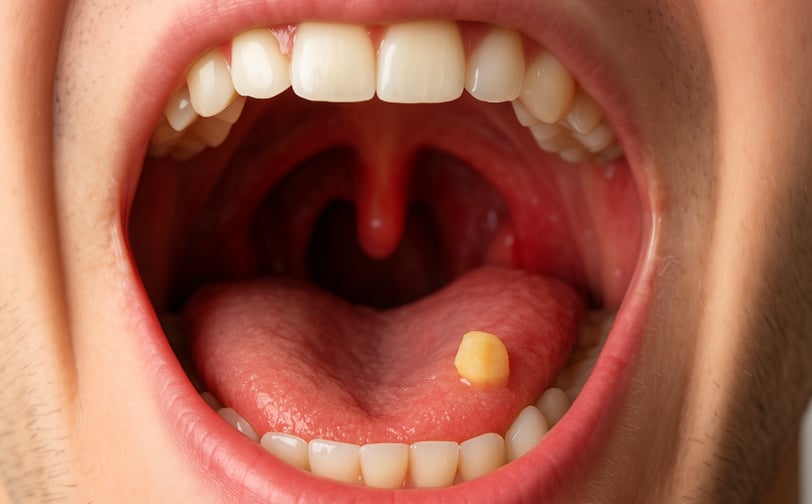Tonsil Stones: What They Are, Causes, Symptoms, and How to Treat Them Naturally
Discover what tonsil stones (caseum) are, why they form, and how to treat them naturally. Learn about symptoms, causes, and effective remedies to eliminate bad breath and throat discomfort caused by these common but overlooked formations.
6/26/20252 min read


Tonsil stones are a relatively common problem, yet little known or discussed. These are small white or yellowish formations that occur in the tonsils, medically known as tonsilloliths or caseum.
They usually have a soft, doughy texture, but can solidify and become harder, similar to stones—hence the name. Fortunately, unlike gallstones or kidney stones, tonsil stones are harmless and can be resolved by addressing the root cause.
How Are Tonsil Stones Formed?
There’s no definitive answer, but two main theories explain their formation:
Food Debris Accumulation The older theory suggests that crushed food particles lodge in the crypts (tiny crevices on the surface of the tonsils), where they ferment due to bacterial action. This fermentation hardens the content and produces a foul smell and discomfort in the throat.
Chronic Inflammation of the Throat A more recent and widely accepted explanation is that tonsil stones are formed by a secretion known as exudate, produced by the tonsils during chronic pharyngitis. This persistent throat inflammation not only leads to the formation of stones but also causes low-grade pain, bad breath, throat clearing, and the sensation of a “lump” in the throat.
Symptoms of Tonsil Stones
Persistent bad breath (halitosis)
White or yellowish stones in the back of the throat
Sore throat or discomfort while swallowing
Feeling of something stuck in the throat
Constant throat clearing (piggoro)
Swollen tonsils
What Triggers Chronic Pharyngitis and Caseum Formation?
The most common triggers include:
Allergic rhinitis
Sinusitis
Gastroesophageal reflux disease (GERD)
Environmental factors such as pollution, smoking, or dry air
Recurrent viral or bacterial infections
It’s important to note that tonsil stones are not related to poor oral hygiene. Even people who brush and floss regularly may develop them.
When to See a Doctor
If you notice whitish masses on your tonsils or are experiencing chronic bad breath and throat discomfort, you should consult an ENT specialist. Diagnosis often involves identifying the underlying cause through tests such as:
Nasal endoscopy
CT scan of the sinuses
Gastrointestinal endoscopy
How Are Tonsil Stones Treated?
Treatment focuses on the underlying condition:
Mild cases:
Gargling with salt water or chlorhexidine mouthwash
Using an oral irrigator (low-pressure water jet)
Drinking plenty of water to maintain hydration
Recurrent or moderate cases:
Addressing reflux, rhinitis, or sinus infections with specific medications
Nasal sprays or antihistamines for allergic conditions
Lifestyle adjustments (e.g., avoiding allergens or acidic foods)
Severe or persistent cases:
Tonsillectomy (surgical removal of the tonsils), especially if there are structural deformities that trap caseum frequently.
What NOT to Do
Avoid trying to remove the stones with:
Cotton swabs
Toothbrushes
Metal tools
Fingers
These methods can injure the tonsils, cause bleeding, and worsen the crypts, leading to more caseum formation.
Natural Ways to Help Prevent Tonsil Stones
While medical diagnosis is essential, you can adopt natural strategies to support prevention:
Stay hydrated – Dry mouth contributes to bacterial buildup.
Use xylitol gum – Promotes saliva production and reduces bacteria.
Oil pulling – Traditional method using coconut oil to reduce oral bacteria.
Nasal hygiene – Use saline sprays or nasal irrigation to reduce post-nasal drip.
Anti-inflammatory teas – Chamomile or ginger tea may reduce chronic throat irritation.
Conclusion
Tonsil stones may be small, but their effects on comfort and confidence—especially due to bad breath—can be significant. Fortunately, thTaey’re treatable and preventable with proper care, diagnosis, and healthy habits.
If you’re suffering from chronic throat issues or notice white lumps in your tonsils, don’t try to fix it on your own. Look for professional guidance to address the root cause and improve your quality of life.
Tags
#TonsilStones #Caseum #BadBreath #ChronicPharyngitis #NaturalRemedies #ThroatHealth #ENTcare #Sinusitis #Reflux #OralHygiene
Nature
Explore natural solutions for your health.
Health
Solution
info@termeszeteslet.hu
+36123456789
© 2025. All rights reserved.
